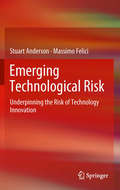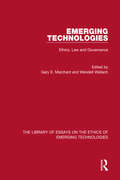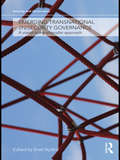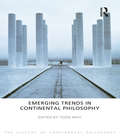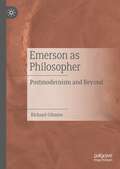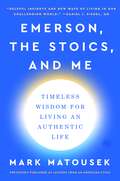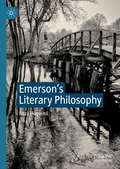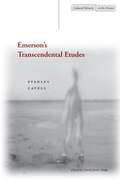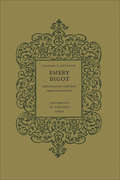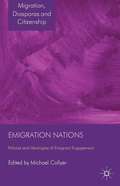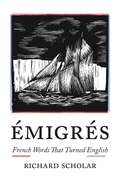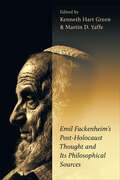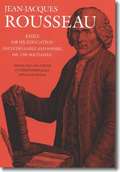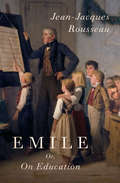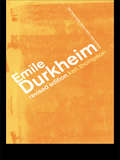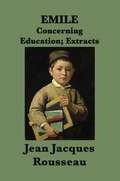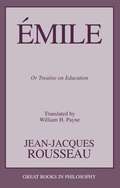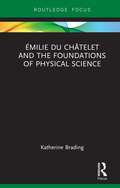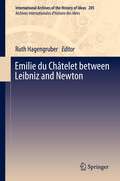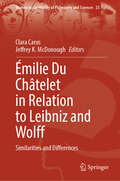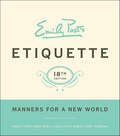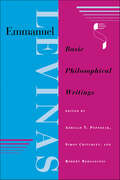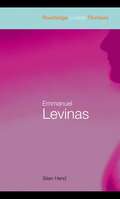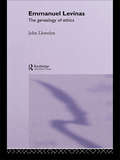- Table View
- List View
Emerging Powers, Global Justice and International Economic Law: Reformers of an Unjust Order?
by Andreas BuserThe book assesses emerging powers’ influence on international economic law and analyses whether their rhetoric of reforming this ‘unjust’ order translates into concrete reforms. The questions at the heart of the book surround the extent to which Brazil, Russia, India, China, and South Africa individually and as a bloc (BRICS) provide alternative regulatory ideas to those of ‘Western’ States and whether they are able to convert their increased power into influence on global regulation. To do so, the book investigates two broader case studies, namely, the reform of international investment agreements and WTO reform negotiations since the start of the Doha Development Round. As a general outcome, it finds that emerging powers do not radically challenge established law. ‘Third World’ rhetoric mostly does not translate into practice and rather serves to veil economic interests. Still, emerging powers provide for some alternative regulatory ideas, already leading to a diversification of international economic law. As a general rule, they tend to support norms that allow host States much policy space which could be used to protect and fulfil socio-economic human rights, especially – but not only – in the Global South.
Emerging Technological Risk
by Massimo Felici Stuart AndersonClasses of socio-technical hazards allow a characterization of the risk in technology innovation and clarify the mechanisms underpinning emergent technological risk. Emerging Technological Risk provides an interdisciplinary account of risk in socio-technical systems including hazards which highlight: · How technological risk crosses organizational boundaries, · How technological trajectories and evolution develop from resolving tensions emerging between social aspects of organisations and technologies and · How social behaviour shapes, and is shaped by, technology. Addressing an audience from a range of academic and professional backgrounds, Emerging Technological Risk is a key source for those who wish to benefit from a detail and methodical exposure to multiple perspectives on technological risk. By providing a synthesis of recent work on risk that captures the complex mechanisms that characterize the emergence of risk in technology innovation, Emerging Technological Risk bridges contributions from many disciplines in order to sustain a fruitful debate. Emerging Technological Risk is one of a series of books developed by the Dependability Interdisciplinary Research Collaboration funded by the UK Engineering and Physical Sciences Research Council.
Emerging Technologies: Ethics, Law and Governance (The\library Of Essays On The Ethics Of Emerging Technologies Ser.)
by Gary E. Marchant Wendell WallachEmerging technologies present a challenging but fascinating set of ethical, legal and regulatory issues. The articles selected for this volume provide a broad overview of the most influential historical and current thinking in this area and show that existing frameworks are often inadequate to address new technologies - such as biotechnology, nanotechnology, synthetic biology and robotics - and innovative new models are needed. This collection brings together invaluable, innovative and often complementary approaches for overcoming the unique challenges of emerging technology ethics and governance.
Emerging Transnational: A Statist-Transnationalist Approach (Security and Governance)
by Ersel AydinliThis book presents a selection of edited essays written by leading international scholars engaging with practicing intelligence, military, and police officers and responding to their first-hand international security cooperation experiences. The resulting chapters provide original theoretical perspectives on evolving international security cooperation practices. Beginning with the premise that intelligence cooperation-domestically between agencies, internationally between states, and transnationally among states, sub-state and non-state actors-is essential in order to successfully counter the evolving transnational nature of security threats, the authors explore the transnationalization in states' responses to a transnational security threat like 'global' terror. They assess whether early signs of a "statist transnationalism" for a new global security cooperation regime can be identified, and look at the use of extraordinary rendition and police liaisons as means for the development and growth of transnational security cooperation. This book will be of interest to students and scholars of international relations, terrorism, security, policing and intelligence.
Emerging Trends in Continental Philosophy (The History of Continental Philosophy #8)
by Todd May"Emerging Trends in Continental Philosophy" presents a comprehensive and accessible analysis of the most recent developments in European thought. From feminist thought to environmental philosophy to analytic themes in Continental philosophy to recent discussions of citizenship, "Emerging Trends" offers an overview of the currents animating contemporary Continental philosophy. The volume focuses on thematic developments rather than individual figures, allowing the reader to follow the threads that weave different thinkers together. Each essay is written by an expert in the area covered, displaying the passion of these experts for the fields they discuss without lapsing into jargon. The volume provides a broad map of the landscape of recent European thought as well as the latest thinking from leading scholars on key themes.
Emerson as Philosopher: Postmodernism and Beyond
by Richard GilmoreThis book considers the role of postmodernism (skepticism towards metanarratives and anti-essentialism) in Ralph Waldo Emerson's philosophy by putting it in conversation with key 20th and 21st century thinkers such as Beauvoir, Coates, Derrida, Paz, Rorty, and Zizek. Postmodern Emerson shows how Emersonian skepticism to metanarratives such as sexism, racism, Beauvoiran "serious values," and others, can help us face some of society's gravest contemporary social and philosophical challenges. Methodologically, the book exemplifies Emersonian postmodernism by defying traditional philosophical metanarratives about the difference between high and low culture or serious and ridiculous subjects, and Emerson with what would seem to be his opposite. This is itself a postmodern gesture, breaking rules of genre and topic to make unlikely but interesting connections. Above all, this book proves that in this time of social division and widespread despair, Emerson can help.
Emerson, the Stoics, and Me: Timeless Wisdom for Living an Authentic Life
by Mark Matousek“This is a beautiful book, full of ideas that could help restore America’s genius for freedom and promise.” —Thomas Moore, New York Times bestselling author of Care of the SoulA lifelong Emersonian scholar, teacher, and spiritual seeker reveals how American philosopher Ralph Waldo Emerson’s twelve essential teachings hold the answer to living an authentic and fulfilling life, one that is in harmony with our souls.Ralph Waldo Emerson was a spiritual revolutionary whose profound vision of human potential came to define the American character. Known as America’s original Stoic, he offered a radical message of optimism, authenticity, and self-realization that is more necessary today than ever.In this timely, remarkable book, noted memoirist and teacher Mark Matousek reveals the depths of Emerson’s extraordinary wisdom, demonstrating how his timeless philosophy can help us navigate the challenges of contemporary life. Using personal stories, psychological research, and life lessons from Emerson and his contemporaries—including Thoreau and Whitman—he offers practical lessons in the art of living.They include:ON ORIGINALITY—Character is everythingON PERSPECTIVE—You are how you seeON NONCONFORMITY—Build your own worldON RESILIENCE—Without confidence, the universe is against youON VITALITY—A stream of power runs through youAnd moreEmerson’s far-reaching vision of excellence and spiritual flourishing is the medicine we need to heal ourselves. “Trust yourself,” he teaches. “Once you make a decision, the universe conspires to make it happen.” This philosophy of hope, known as transcendentalism, is the vein of gold in the American psyche. Lessons from an American Stoic helps us to reclaim our national treasure.
Emerson's Literary Philosophy
by Reza HosseiniThis book situates Ralph Waldo Emerson in the tradition of philosophy as “spiritual exercise”, arguing that the defining feature of his literary philosophy is the conviction that there is an inherent link between moral persuasion and literary excellence. Hosseini persuasively argues that the Emersonian project can be viewed as an extension of Socrates’ call for a return to the beginning of philosophy, to search for a way of revolutionizing our ways of seeing from within. Examining Emerson’s provocative style of writing, Hosseini contends that his prose is shaped by a desire to bring about psychagogia, or influencing the soul through the power of words. This book furthermore examines the evolving nature of Emerson’s thoughts on “scholarly action” and its implications, his religious temperament as an aesthetic experience of the world through wonder, and the reasons for a resounding acknowledgment of despair in his essay “Experience.” In the concluding chapter, Hosseini explores the depth of Emerson’s engagement with the classical Persian poets and argues that what we may call his “literary humanism” is informed by Persian Adab, exemplified in the writings of Rumi, Hafiz, and Saadi. Weaving together themes from Persian philosophy and Emersonian transcendentalism, Hosseini establishes Emerson’s way of seeing as refreshingly relevant, showing that the questions he tackled in his writings are as pressing today as they were in his time.
Emerson's Transcendental Etudes
by Stanley Cavell David Justin HodgeThis book is Stanley Cavell’s definitive expression on Emerson. Over the past thirty years, Cavell has demonstrated that he is the most emphatic and provocative philosophical critic of Emerson that America has yet known. The sustained effort of that labor is drawn together here for the first time into a single volume, which also contains two previously unpublished essays and an introduction by Cavell that reflects on this book and the history of its emergence. Students and scholars working in philosophy, literature, American studies, history, film studies, and political theory can now more easily access Cavell’s luminous and enduring work on Emerson. Such engagement should be further complemented by extensive indices and annotations. If we are still in doubt whether America has expressed itself philosophically, there is perhaps no better space for inquiry than reading Cavell reading Emerson.
Emery Bigot: Seventeenth-Century French Humanist
by Leonard DoucetteEmery Bigot's life spans the most brilliant years of seventeenth-century France. He left some six hundred letters addressed to the four corners of literary Europe; among his correspondents, acquaintances, and friends were men of the stature of Jean Chapelain, Nicolaus Heinsius, Charles du Cange, Richard Simon, John Milton, and Gilles Ménage. He travelled widely and was for some forty years at the very centre pf a firmly established, smoothly functioning network of mutual assistance and scholarly information that linked the countries of western Europe. From Uppsala to Venice, from Vienna to Oxford, Leiden, London: a network which quite naturally considered Paris its centre, and whose members represented every interest, very segment of intellectual society. Bigot was also the creator of what was perhaps the most important private library of his era. Yet today he is almost unknown, and his correspondence, scattered widely, has not been examined thoroughly since his death. This detailed biography and critical study is based on Bigot's letters and on other unpublished materials in France, Italy, Holland, Denmark, and England. Although much effort has been directed towards research on the more prominent contemporaries of Bigot, he himself – better known to the scholars of his period than a Racine, a La Fontaine, or a Molière – has gone unappreciated. Professor Doucette's book shows that Bigot represents an essential and seriously neglected side of French and European humanistic studies in the seventeenth century. Bigot's role as an outstanding classical scholar and bibliographic expert, his publications and projects for publications, his correspondence, and what is perhaps the most important facet of his activity, his collaboration with other authors in seventeenth-century Europe, all receive full and intensive coverage. This book holds special interest for scholars in several disciplines, especially historians of French literature and civilization, classicists, philologists, bibliophiles and bibliographers, and historians of religion.
Emigration Nations
by Michael CollyerUntil very recently emigrants were considered an embarrassment, an irritation or an irrelevance by most states. The long experience of emigrant engagement in certain historical emigration countries, such as Italy, was very much the exception. Since about 2000, countries around the world have shown much greater enthusiasm for policies to encourage the loyalty of nationals who have made a permanent home elsewhere. These developments have changed the relationship between state institutions and emigrant nationals. Policies of emigrant engagement also challenge fundamental understandings about the nature of political society in the modern era; the notion of states as territorial institutions or the understanding of citizenship as membership in a territorially bounded polity are both undermined. This book provides copious evidence of this process, with detailed, comparable case studies of twelve countries and a new theoretical framework that helps explain changing policies towards emigrants.
Émigrés: French Words That Turned English
by Richard ScholarThe fascinating history of French words that have entered the English language and the fertile but fraught relationship between English- and French-speaking cultures across the world.English has borrowed more words from French than from any other modern foreign language. French words and phrases—such as à la mode, ennui, naïveté and caprice—lend English a certain je-ne-sais-quoi that would otherwise elude the language. Richard Scholar examines the continuing history of untranslated French words in English and asks what these words reveal about the fertile but fraught relationship that England and France have long shared and that now entangles English- and French-speaking cultures all over the world.Émigrés demonstrates that French borrowings have, over the centuries, “turned” English in more ways than one. From the seventeenth-century polymath John Evelyn’s complaint that English lacks “words that do so fully express” the French ennui and naïveté, to George W. Bush’s purported claim that “the French don’t have a word for entrepreneur,” this unique history of English argues that French words have offered more than the mere seasoning of the occasional mot juste. They have established themselves as “creolizing keywords” that both connect English speakers to—and separate them from—French. Moving from the realms of opera to ice cream, the book shows how migrant French words are never the same again for having ventured abroad, and how they complete English by reminding us that it is fundamentally incomplete.At a moment of resurgent nationalism in the English-speaking world, Émigrés invites native Anglophone readers to consider how much we owe the French language and why so many of us remain ambivalent about the migrants in our midst.
Emil Fackenheim’s Post-Holocaust Thought and Its Philosophical Sources (The Kenneth Michael Tanenbaum Series in Jewish Studies)
by Kenneth Hart Green Martin D. YaffeRecognized as one of the leading philosophers and Jewish thinkers of the twentieth century, Emil Ludwig Fackenheim has been widely praised for his boldness, originality, and profundity. As is well-known, a striking feature of Fackenheim’s thought is his unwavering contention that the Holocaust brought about a radical shift in human history, so monumental and unprecedented that nothing can ever be the same again. Fackenheim regarded it as the specific duty of thinkers and scholars to assume responsibility to probe this historical event for its impact on the human future and to make its immense ramifications evident. In Emil Fackenheim’s Post-Holocaust Thought and Its Philosophical Sources, scholars consider important figures in the history of philosophy – including Kant, Hegel, Heidegger, and Strauss – and trace how Fackenheim's philosophical confrontations with each of them shaped his overall thought. This collection details which philosophers exercised the greatest influence on Fackenheim, and how he diverged from them. Incorporating widely varying approaches, the contributors in the volume wrestle with this challenge historically, politically, and philosophically in order to illuminate the depths of Fackenheim’s own thought.
Emile: The Collected Writings of Rousseau Vol. 13
by Jean-Jacques Rousseau Allan Bloom Christopher KellyThe acclaimed series The Collected Writings of Jean-Jacques Rousseau concludes with a volume centering on Emile (1762), which Rousseau called his "greatest and best book. " Here Rousseau enters into critical engagement with thinkers such as Locke and Plato, giving his most comprehensive account of the relation between happiness and citizenship, teachers and students, and men and women. In this volume Christopher Kelly presents Allan Bloom's translation, newly edited and cross-referenced to match the series. The volume also contains the first-ever translation of the first draft of Emile, the "Favre Manuscript," and a new translation of Emile and Sophie, or the Solitaries. The Collected Writings of Rousseau Roger D. Masters and Christopher Kelly, series editors 1. Rousseau, Judge of Jean-Jacques: Dialogues 2. Discourse on the Sciences and Arts (First Discourse) and Polemics 3. Discourse on the Origins of Inequality (Second Discourse) Polemics, and Political Economy 4. Social Contract, Discourse on the Virtue Most Necessary for a Hero, Political Fragments, and Geneva Manuscript 5. The Confessions and Correspondence, Including the Letters to Malesherbes 6. Julie, or the New Heloise: Letters of Two Lovers Who Live in a Small Town at the Foot of the Alps 7. Essay on the Origin of Languages and Writings Related to Music 8. The Reveries of the Solitary Walker, Botanical Writings, and Letter to Franqui#65533;res 9. Letter to Beaumont, Letters Written from the Mountain 10. Letter to D'Alembert and Writings for the Theater 11. The Plan for Perpetual Peace, On the Government of Poland, and Other Writings on History and Politics 12. Autobiographical, Scientific, Religious, Moral, and Literary Writings 13. Emile or On Education (Includes Emile and Sophie; or The Solitaries)
Emile: Or On Education
by Jean-Jacques Rousseau Barbara FoxleyThe once banned and burned treatise on the nature of education from the eighteenth-century philosopher and author of The Social Contract. Considered by Jean-Jacques Rousseau himself to be the &“best and most important&” of all his writings, Émile set off a firestorm when it was first published in 1762. It was banned in Paris and burned in Geneva, but later served as the inspiration for a new national system of education during the French Revolution. In its pages, Émile and his tutor embark on a scholarly journey through the boy&’s upbringing. The book also follows the character of Sophie, commenting on the role of women in society. &“More a tract upon education with the appearance of a story than it is a novel, the book describes the ideal education which prepares Émile and Sophie for their eventual marriage&” (The Roots of Educational Theory). &“Jean-Jacques Rousseau&’s Émile or Treatise on Education remains relevant today. The theories and beliefs of Enlightenment philosophers such as Rousseau played a big role in shaping the beliefs of the public at the time, particularly when they were able to distribute their ideas on paper. Without written documents such as this one, it would be impossible to understand their impact on society and, more broadly, on how the idea of nature-based gender and separated spheres have evolved to what they are today.&” —Towards Emancipation?
Emile Durkheim
by Prof Kenneth ThompsonThis book examines Durkheim's considerable achievements and situates them in their social and intellectual contexts, with a concise account of the major elements of Durkheim's sociology. The book includes a critical commentary on the four main studies which exemplify Durkheim's contribution to sociology: The Division of Labour in Society; Suicide; The Rules of Sociological Method and The Elementary Forms of Religious Life.
Emile or Concerning Education
by Jean Jacques Rousseauémile, or On Education is a treatise on the nature of education and on the nature of man written by Jean-Jacques Rousseau, who considered it to be the "best and most important of all my writings." Due to a section of the book entitled "Profession of Faith of the Savoyard Vicar," émile was banned in Paris and Geneva and was publicly burned in 1762. During the French Revolution, émile served as the inspiration for what became a new national system of education.
Émile Or Treatise on Education
by Jean-Jacques Rousseau William H. PayneIn his pioneering treatise on education the great French philosopher presented concepts that had a significant influence on the development of pedagogy, and yet many of his ideas still sound radical today. Written in reaction to the stultifying system of rote learning and memorization prevalent throughout Europe in Rousseau's time, Émile is a utopian vision of child-centered education, full of the sentiments of Romanticism, which Rousseau himself inspired. Educators as well as students of philosophy will find much to admire in Rousseau's original and still radical ideas.
Émilie Du Châtelet and the Foundations of Physical Science (Routledge Focus on Philosophy)
by Katherine BradingThe centerpiece of Émilie Du Châtelet’s philosophy of science is her Foundations of Physics, first published in 1740. The Foundations contains epistemology, metaphysics, methodology, mechanics, and physics, including such pressing issues of the time as whether there are atoms, the appropriate roles of God and of hypotheses in scientific theorizing, how (if at all) bodies are capable of acting on one another, and whether gravity is an action-at-a-distance force. Du Châtelet sought to resolve these issues within a single philosophical framework that builds on her critique and appraisal of all the leading alternatives (Cartesian, Newtonian, Leibnizian, and so forth) of the period. The text is remarkable for being the first to attempt such a synthetic project, and even more so for the accessibility and clarity of the writing. This book argues that Du Châtelet put her finger on the central problems that lay at the intersection of physics and metaphysics at the time, and tackled them drawing on the most up-to-date resources available. It will be a useful source for students and scholars interested in the history and philosophy of science, and in the impact of women philosophers in the early modern period.
Emilie du Châtelet between Leibniz and Newton
by Ruth HagengruberEmilie du Châtelet was one of the most influential woman philosophers of the Enlightenment. Her writings on natural philosophy, physics, and mechanics had a decisive impact on important scientific debates of the 18th century. Particularly, she took an innovative and outstanding position in the controversy between Newton and Leibniz, one of the fundamental scientific discourses of that time. The contributions in this volume focus on this "Leibnitian turn". They analyze the nature and motivation of Emilie du Châtelet's synthesis of Newtonian and Leibnitian philosophy. Apart from the Institutions Physiques they deal with Emilie du Châtelet's annotated translation of Isaac Newton's Principia. The chapters presented here collectively demonstrate that her work was an essential contribution to the mediation between empiricist and rationalist positions in the history of science.
Émilie Du Châtelet in Relation to Leibniz and Wolff: Similarities and Differences (Women in the History of Philosophy and Sciences #23)
by Jeffrey K. McDonough Clara CarusThis book offers the first detailed comparison between Émilie Du Châtelet's philosophy and her predecessors G.W. Leibniz and Christian Wolff. It highlights the similarities and the differences between her work and the ideas of Leibniz and Wolff. The book's chapters explore a wide range of key concepts and topics, including freedom, love, space, extension, certainty, probability, the continuum, time, eternity, the world apart doctrine, and the principle of sufficient reason. The book as a whole situates Du Châtelet’s thought in the context of her predecessors and highlights how Du Châtelet’s understanding of her sources laid the foundations for the development of her own ideas. This edition will be of crucial interest to the growing community of scholars working on Du Châtelet’s thought as well as scholars of Early Modern Philosophy more generally.
Emily Post's Etiquette: Manners for a New World
by Peggy Post Anna Post Lizzie Post Daniel Post SenningIn this completely updated 18th Edition of the classic Emily Post’s Etiquette, the mantle is picked up by the great-great-grandchildren of the First Lady of Etiquette, who tackle the latest issues and demands of the twenty-first century—from texting and tweeting to iPhones, Facebook, and all forms of social media. Millions of Readers, Eighteen Editions, One Trusted ResourceFrom social networking to social graces, the name Emily Post has been the definitive source on etiquette for generations of Americans. That tradition continues with the 18th edition of Etiquette, which welcomes a new generation of Posts—Anna Post, Lizzie Post, and Daniel Post Senning—the great-great grandchildren of Emily Post. Led by Peggy Post, author of the 16th and 17th editions of Etiquette, this team shows how twenty-first-century manners are a combination of kindness, confidence, and awareness.New trends, topics, and societal hot zones include:When is it okay to “unfriend” someone on Facebook?If I’m in a middle seat on an airplane, do I automatically get both armrests?A business client is sick with a cold—am I obligated to shake his hand?Is it rude for guests to tweet from a wedding?Do I have to buy a gift if I attend a destination wedding?Can I email a condolence note?Should I cover up my tattoo for a job interview?The Posts don’t stint on classic conundrums, either. Emily Post’s Etiquette includes advice on names and titles, dress codes, invitations, table manners, workplace frustrations, and weddings.According to the Posts, though times have changed, the principles of good manners remain constant. Above all, manners are a sensitive awareness of the feelings of others. Being considerate, respectful, and honest is more important than knowing which fork to use. Whether it’s a handshake or a fist bump, it’s the underlying sincerity and good intentions of the action that matter most.
Emmanuel Levinas: Basic Philosophical Writings (Studies in Continental Thought)
by Adriaan T. Peperzak, Simon Critchley, and Robert BernasconiEmmanuel Levinas (1906–1996) has exerted a profound influence on 20th-century continental philosophy. This anthology, including Levinas's key philosophical texts over a period of more than forty years, provides an ideal introduction to his thought and offers insights into his most innovative ideas. Five of the ten essays presented here appear in English for the first time. An introduction by Adriaan Peperzak outlines Levinas's philosophical development and the basic themes of his writings. Each essay is accompanied by a brief introduction and notes. This collection is an ideal text for students of philosophy concerned with understanding and assessing the work of this major philosopher.
Emmanuel Levinas (Routledge Critical Thinkers)
by Seán HandBest known for his theories of ethics and responsibility, Emmanuel Levinas was one of the most profound and influential thinkers of the last century. In this clear, accessible guide, Seán Hand examines why Levinas is increasingly fundamental to the study of literature and culture today. Exploring the intellectual and social contexts of his work and the events that shaped it, Hand considers: the influence of phenomenology and Judaism on Levinas’s thought key concepts such as the ‘face’, the ‘other’, ethical consciousness and responsibility Levinas’s work on aesthetics the relationship of philosophy and religion in his writings the interaction of his work with historical discussions his often complex relationships with other theorists and theories Emmanuel Levinas’s unique contribution to theory set an exemplary standard for all subsequent thought. This outstanding guide to his work will prove invaluable to scholars and students across a wide range of disciplines - from philosophy and literary criticism through to international relations and the creative arts.
Emmanuel Levinas: The Genealogy of Ethics (Warwick Studies in European Philosophy)
by John LlewelynFirst Published in 2004. Routledge is an imprint of Taylor & Francis, an informa company.

